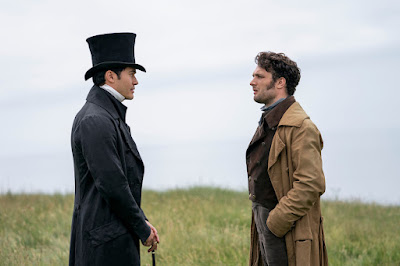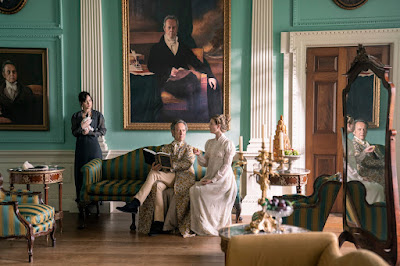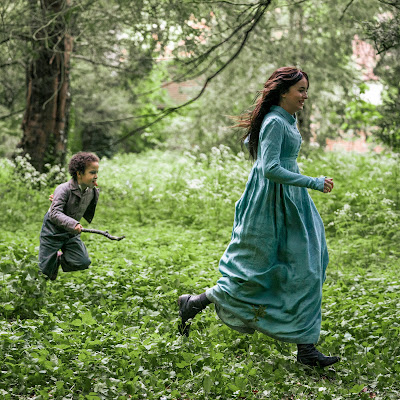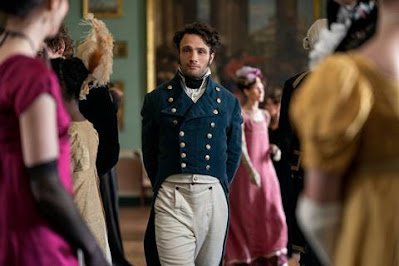If there is something British cinema does very well, it is costume dramas adapted from classic novels.
Whether it is David Lean bringing the work of Charles Dickens to the big screen or Alfred Hitchcock adapting Daphne du Maurier, Merchant Ivory's versions of EM Forster novels or Andrea Arnold giving her take on Emily Bronte's 'Wuthering Heights,' British filmmakers have excelled at this type of movie.
Non Americans like William Wyler, Ang Lee, Whit Stillman, Thomas Vinterberg and Autumn de Wilde have also made superb versions of classic novels by following the British costume drama template or slightly tweaking it - as anyone who has seen'Wuthering Heights,' 'Sense and Sensibility,' 'Love and Friendship,' 'Far From The Madding Crowd' and 'Emma' can testify.
While on the small screen, the BBC, ITV and Channel 4 have over the years memorably adapted the works of Charles Dickens, Jane Austen, Thomas Hardy, William Thackeray, Elizabeth Gaskell, Anthony Trollope, Emily and Charlotte Brontë.
When Netflix announced plans to add English theatre director Carrie Cracknell's adaptation of 'Persuasion' to its roster in July, there was some understandable interest and excitement.
During a summer dominated by fighter jets, roaring dinosaurs, CIA assassin's on the run, superhero after superhero and Elvis, the prospect of a good costume drama felt like welcome respite.
How wrong we were.
Unfortunately, 'Persuasion' isn't a good adaptation of a classic Jane Austen novel.
In fact, it's rather limp.
Cracknell and her screenwriters Ronald Bass and Alice Victoria Winslow have opted to give Jane Austen's novel a modern twist.
Of course, there's nothing wrong with that.
Baz Luhrmann's best movie is unquestionably 'Shakespeare's Romeo and Juliet' which gave the conflict between the Montagus and the Capulets a Tarantino-style take on an LA street gang drama.
Other movies like Gil Junger's 'Ten Things I Hate About You,' Amy Heckerling's 'Clueless' and Will Gluck's 'Easy A' are smart, contemporary tales inspired by 'The Taming of the Shrew,''Emma' and 'The Scarlet Letter'.
Even 'Bridget Jones Diary' is inspired by 'Pride and Prejudice'.
Meanwhile Armando Iannucci's joyous 'The Personal History of David Copperfield' showed what could be achieved by playing around with the source novel and deploying superb, imaginative casting.
Cracknell, Bass and Winslow have, like Iannucci, kept the period setting and infused it with latter day storytelling techniques - like the regular breaking of the fourth wall and colour blind casting.
There's nothing wrong with either approach if done well.
But Cracknell's movie consistently gets these and other elements of the movie wrong.
Dakota Johnson is cast as Anne Elliot, the heroine of Jane Austen's novel, who has not quite recovered from the break-up eight years before of her relationship with Cosmo Jarvis' sea captain Frederick Wentworth.
This breakup was on the back of misguided advice from her godmother Nikki Amuka-Bird's Lady Russell not to marry a man with no fortune.
If that wasn't enough, Anne's vain, spendthrift father, Richard E Grant's Sir Walter Elliot has pushed her family and their estate at Kellynch Hall to the brink of financial ruin.
She also has to tolerate Yolanda Kettle's class and image obsessed older sister Elizabeth and Mia McKenna Bruce's self-obsessed younger sister Mary.
For much of the film, though, Anne and Frederick spend most of the time in a state of deep frustration and desperate longing for each other.
While her father and Elizabeth relocate to Bath, Anne knocks about with her in-laws the Musgroves attending a dinner with Mary, Ben Bailey Smith's Charles, his sister's Izuka Hoyle's Henrietta and Nia Towle's Louisa and Wentworth.
We discover during the dinner that Charles once proposed to Anne which causes more awkwardness between her and Frederick who have moved into the "just good friends" territory.
And soon Frederick, Henrietta, Louisa and Anne are off to Lyme Regis to visit two Naval friends of his - Edward Bluemel's Captain Harville and Afollabi Ali's Captain Benwick who is in mourning over the death of his fiance.
During the visit to Lyme Regis, Anne encounters Henry Golding's confident but caddish Mr Elliot who lavishes a lot of attention towards her - despite the of from her father and Elizabeth that if Elizabeth marries him the family fortune will be restored.
But will her heart rule her head?
Cracknell, Bass and Winslow fuse elements of the modern day romcom and the sarcastic feminist sitcom with Austen's story.
So what you get is an Anne who fires knowing looks at the viewer throughout the film and breaks the fourth wall regularly like Phoebe Waller Bridge's 'Fleabag'.
And when she is not doing that, Dakota Johnson's Anne is slumped Bridget Jones-style on the floor rather unconvincingly swigging wine from a bottle or on her bed in a state of romantic depression.
She's also not averse to relieving herself when caught short or enjoying quips about farts at the Musgroves' dinner table.
The whole 'Fleabag' obsession in TV drama and film, though, has become so tired and consequently Johnson's asides feel unnecessary and irritating.
The decision to also give her the traits of a Bridget Jones-style heroine doesn't sit well when compared to previous adaptations of Austen's novel.
Bass and Winslow's adopt Millennial speak to give their characters modern relevance and so you have Elizabeth observe: "If you're a five in London, you're a ten in Bath".
Or Anne bemoaning in one aside that she and Frederick are "worse than exes, we're friends".
Or her quip to Mr Elliot: "Imagine my luck - a flirt and a hard worker."
All of this is pretty ear scraping and it does the cast little favours.
Johnson is okay in the lead role and makes a decent stab at an English accent while conveying Anne's intelligence and wit.
However she cannot overcome the script's deficiencies, nor should she have focused on pretending to be a cross between Fleabag and Bridget Jones.
Her version of Anne is so free spirited and flawed that it dilutes the biggest aspect of the novel - Anne's underlying ache of unrequited love in a society that is too obsessed with money and status.
It doesn't help that Jarvis is too stiff as Frederick - so stiff that you occasionally have to check the screen to see if he is still breathing.
Grant hams it up as usual as Sir Walter, while Amuka-Bird, Kettle, McKenna Bruce, Bailey Smith, Hoyle, Towle, Bluemel and Ali do their best with very slim pickings.
Golding is well suited to the role of Mr Elliot and adds a bit of fizz to proceedings.
However the most impressive aspects of Cracknell's adaptation are Joe Anderson's cinematography, Marianne Agertoft's costumes, John Paul Kelly's production design and Faye Brothers' set decoration.
These are so spot on, they only add to sense of frustration with this adaptation.
They leave the viewer regretting what might have been had Cracknell, Bass and Winslow not been so obsessed with getting down with the Millennial kids.
Austen's novel did a pretty good job skewering contemporary society in the Regency Era and its attitudes to women and wealth.
It is beautifully written which is why you need to be careful tampering with it.
Armando Iannucci's 'The Personal History of David Copperfield' shows how that can be done.
Carrie Cracknell's 'Persuasion' feels like an opportunity dreadfully wasted.
While it is perfectly legitimate to tailor classics to modern audiences, this film should serve as a lesson why screenwriters need to be very careful with the narrative techniques they deploy.
('Persuasion' was made available for streaming on Netflix on July 15, 2022)

.jpg)
.jpeg)










Comments
Post a Comment